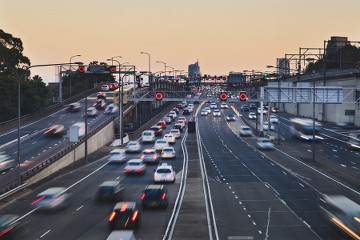 For over 100 years the automotive industry has grown exponentially both in numbers and innovation. We have some of the safest vehicles available today in comparison with a few decades ago, yet accidents on the road are a common occurrence and can lead to serious injuries. In this post I will talk about 5 common road accident causes, how to avoid them and what you should do if you are involved in an accident and are injured as a result.
For over 100 years the automotive industry has grown exponentially both in numbers and innovation. We have some of the safest vehicles available today in comparison with a few decades ago, yet accidents on the road are a common occurrence and can lead to serious injuries. In this post I will talk about 5 common road accident causes, how to avoid them and what you should do if you are involved in an accident and are injured as a result.
The UK has roughly 35 million vehicles on its roads, a lot of which are congregated in a select number of motorways and cities. From a purely statistical point of view, such a high number of vehicles in close proximity to each other in a small geographical area would suggest that there is a high chance for a collision to occur. After all we are all human and by definition we are prone to making mistakes. The main hope is to learn from them and not repeat them.
Some of the most common mistakes made on the road which can result in an accident are:
- Speeding
- Drink Driving
- Inexperience
- Failing to Look Properly
- Failing to judge the Other Driver’s Path/Speed
Speeding
It’s probably an obvious one and yet it’s in our nature it seems to rush. Couple this with our hectic day to day lives, rushing will result in speeding which may result in an accident with serious repercussions. From mild whiplash all the way to severe brain injury and spinal injury which can lead to paralysis. The latter 2 are life changing injuries which will not only severely diminish the quality of your life, but your loved ones too.
Prevention
The main way of avoiding/preventing speeding and thus a potential accident is to change your thinking. Instead of thinking that the speed limit is the minimum speed we should be driving at, think of it as the maximum level. In terms of time saved versus time “wasted” when speeding and not, there is very little in it (depending on your speed and distance covered) for most of us.
Example
If the average journey to work and back is 20 miles and the speed limit is 60 mph, it would take us 20 minutes to complete (60 mph / 60 minutes in 1 hour x 20). If we broke the speed limit and travelled at 66 mph the time we would save would be 2 minutes (6 is 10% of 60 so 10% of 20 is 2). Ask yourself, is it worth the risk of a fine and 3 points (that take 3 years to come off and 5 years for insurance purposes) for a 2 minute saving? Personally, my answer is no.
Drink Driving
Another obvious one, which also has seasonal peaks depending on the time of year and/or what events are currently happening in the country, but driving whilst over the alcohol drinking limit has serious consequences. Firstly due to the delayed reaction times, you are more prone to being involved in a road traffic accident which can be fatal to you and/or the other party involved. Secondly, if caught, you are treated like a criminal by being handcuffed and taken to the police station, having a criminal record (which can damage current and/or future employment opportunities) and have your license taken off you to name but a few.
Prevention
There is no other way of putting it, but simply:
DON’T Drink and Drive
The UK government invests a lot of money in advertising and drink driving awareness campaigns for our safety on the road. It is just a matter of again, change your way of thinking about drink driving and cut it out as a bad and dangerous habit.
Inexperience
I’m addressing young drivers here mostly as the numbers are as follows: 17-24 year old new drivers (especially male) are the target group which are more prone to having a car accident. This is why during this age, the insurance premium is also very high as the risk of a crash is greater due to inexperience in part, combined with speeding and giving in to peer pressure when behind the wheel (or “showing off”).
Prevention
Just say NO! OK, this may be easier said than done, but think about it in terms of building character. We all know, or I would like to think that we all know the difference between right and wrong, so saying no to speeding will save your lives rather than your time. Now in terms of inexperience, the only way to prevent this is by gaining experience, but to gain experience you have to do the very thing that can potentially cause you harm, drive. So, a few tips are:
- Stick to the rules of the road. They are there for a reason.
- Take extra courses and tuition if possible, such as the Pass Plus.
- Just like when learning a new skill, focus and commitment is required.
- Try and anticipate the danger that may present itself.
Failing to Look Properly
This is again coupled with the speeding point and the general “rush” of our daily lives coupled with all the external and internal distractions that are constant. Because of this, people who fail to look properly tend to just quickly scan the road at a junction especially in order to pull out to get on their way as quickly as possible. Obstacles that partially block their view are also a factor, however with due care and attention, a junction can be safely navigated.
Prevention
Again, it comes down to numbers and time you save when taking these quick decisions unnecessarily. E.g. if you travelled 20 miles to work and back and another 10 miles during day to day jobs that you have to do you would be covering 30 miles. If for every mile travelled you came across 2 junctions on average, it would mean 60 junctions in total on average daily. If you rushed and pulled out too soon, the time you saved could be anything from 1 second to 30 seconds. If the average therefore is 15 seconds, the amount of time you would save daily by taking unnecessary risks is 900 seconds (15 seconds x 60 junctions average per day) which is 15 minutes. This might sound like a large figure, however it is over the period of the day meaning that instead of getting home at 7pm, it would be 7:15. Let me ask you, what is more important to you – getting back home or to your destination late, or not at all? Next time, just think about it. By doing this, you will eventually “build” a new driving habit which will lead to a safer and stress free way of driving.
Failing to Judge the Other Driver’s Path/Speed
There are a number of elements to take into account with this cause. Firstly and physiologically would be eyesight. If you cannot see distances very well and have no reference points in which to judge the speed of an oncoming vehicle, then simply get your eyes tested and wear glasses if necessary. Secondly inexperience can play a role in judging the path and speed of a vehicle. If you ask any experienced driver, they will most likely tell you that you develop a sort of “6th sense” after driving for a while and can anticipate better any dangers ahead and judge speed, distance and path better than a driver who hasn’t been behind the wheel long. Thirdly, negligent and careless driving could play a part in not judging another vehicle’s speed and path, resulting in potential loss of control of the vehicle causing an accident by dangerous driving.
What Should You Do if You are Involved in a Road Traffic Accident?
Here at Personal Injury Solicitors Manchester we hope that you are never involved in a car accident but if you are, we hope it is not serious. Depending on the severity of the accident, you may have no option but to wait for the emergency services to come out and assist you. If however you are in a position to diagnose yourself and are mobile, you should firstly stay calm and if not in a safe place, make your way to a pavement of any safe place away from other oncoming vehicles.
Here are a few steps you should take after you are in a safe place with the other party involved in the accident:
- Information: Share information, such as name, phone number, address, insurance details and car reg numbers with the other party involved in the accident.
- Photographs: Use your camera on your mobile phone to take pictures of the accident from different angles as this provides a vivid account and evidence of what happened. It can also be helpful to keep track of where the incident happened as a lot of things will be going on in your mind.
- Car: Make sure you take down details of the other parties car such as the make and model, colour and amount of damage caused.
- Witnesses: If there are any other witnesses around at the time of the accident, make sure to take down their information such as name, phone number, address as they can be used to provide evidence if necessary.
- Owner: Make sure you take down the car owner details if the driver isn’t the owner of the vehicle involved in the accident with you.
- Police: You should report the accident to the police to avoid any future disputes with the other party involved.
- Insurance Company: Make sure you inform your insurance company of the accident and provide any information they request.
These steps are also published on our Road Traffic Accidents page.
Conclusion
Safety is paramount on the road, couple this with caution and focus. With all these in play and an active way of thinking towards changing bad habits on the road to become good habits will play a significant role in your health and safety when behind the wheel.
Over to you. What do you think? Let us know in the comments section below.
